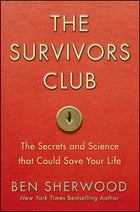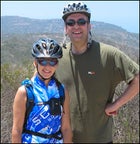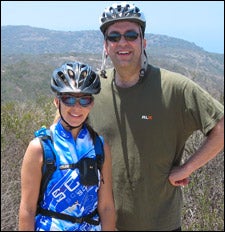After Rhodes Scholar and former Good Morning America executive producer Ben Sherwood lost his friend to a sniper and his father to a brain hemorrhage, he set out to unlock the secrets of survival. While reporting his new book, , Sherwood enrolled in military survival school, interviewed scientists, and investigated a number of harrowing stories. ���ϳԹ���‘s IVAN MILLER caught up with The New York Times best-selling author to see what he learned during his quest.
The Survivors Club
 Ben Sherwood's new book
Ben Sherwood's new bookBen Sherwood and Anne Hjelle
 Sherwood and Anne Hjelle, who survived a mountain lion attack
Sherwood and Anne Hjelle, who survived a mountain lion attack
Why did you write this book?
I wrote it because I needed it (survival) in my own life. In my early forties, things started to happen to friends and family. I began to wonder what the world’s most effective survivors know that the rest of us don’t. I interviewed a lot of survivors and the people that study them to discover those secrets. I wanted to know these things myself, whether it’s surviving extreme stuff like plane crashes and animal attacks or the everyday things people are dealing with now, economic and health challenges.
Was there an epiphany moment, when you realized that you had to write this book?
I used to run Good Morning America, the television show. There wasn’t an epiphany moment, so much as a recurring question that my colleagues and I kept asking. How do these people do it, and how do we get some of it? The epiphany came when I started thinking these people were different, superheroes in some way. It turns out to the contrary, they’re regular people who, in extraordinary circumstances, are able to do remarkable things. In fact, we all have an inner survivor personality, and it’s just waiting to be summoned.
One of your introductory scenes rehashes a bloody tragedy in which your friend was killed by a sniper while on assignment in Sarajevo. How did that experience shape your view on survival?
I was a young producer and had that wonderful ignorance of invulnerability. It was a horrifying moment, driving in from the airport in Sarajevo in August of 1992. Serbs besieged the city and we were on a road known as sniper alley. A single shot was fired. It sounded like the car had backfired. It happened so fast, making it extremely frightening and hard to comprehend. The sniper round had pierced the back door of the Volkswagen van we were moving in, ripping through the back seat. The bullet went through the back of my colleague David Kaplan, who I was sitting shoulder-to-shoulder with in the backseat. He almost immediately went into cardiac arrest. The driver, a Hungarian news-fixer who worked for ABC in Sarajevo, rushed us to the United Nations complex, which was located at the post office. French surgeons ran a makeshift operating service in the basement of the building. They worked on David for an hour and a half, but they were unable to revive him. That was a shattering experience. Then I had to watch the tragic ripples that affected David’s family. It began a process of tragedy in my own life. Six months later, my father, who was 64, collapsed of a massive brain hemorrhage. It was a very introspective period in which I began to become intensely aware of the fragility of life. I began to ask a lot of questions about survival, resilience, and overcoming the terrible knocks that happen in life.
You say this book “unlocks the secrets of who lives and dies and shows how you can improve your chances.” What determines who lives and who dies?
It’s a massive and mysterious question, and in the beginning I thought, foolishly, that it would be easy to answer. Originally, I thought who lives and who dies was largely determined by us, but realized that it’s a combination of genetics, luck, faith, and the will to live. There’s fascinating research proving luck isn’t just random, but something that can be influenced. Some people have more good fortune, and some have more accidents. Survival is an outlook, a mentality. I don’t mean that in a survivalist sense, which I think ���ϳԹ���‘s readers are familiar with. I mean it in a daily sense, that those who beat the odds have a situational awareness to overcoming everyday challenges. They notice emergency exits on airplanes and movie theaters. Survivors are active learners and seek out information, and have more control than you’d think. They don’t passively just let things happen. They try, psychologically, to have a say in what happens in their lives. So they seek information and take action.
You touch on numerous survival stories in the book, was there one in particular that was especially moving?
One of my rules is not to make comparisons. I think that a single mom without health insurance that loses her job is as serious a survival challenge as an encounter with a mountain lion. That said, I was astonished and flabbergasted by the story of Brian Udell, the F-15 pilot that ejected at Mach 1 speed while plummeting toward the ocean (Chapter five). Traveling at 780 mph and ejecting just a few hundred feet from the ocean, the windblast dislocated or broke several bones in his body. His partner, the other pilot, was immediately killed. With only one arm working, Brian managed to get to his inflatable life raft. Brian’s story involved a lot of the elements in the survival chain, his training for instance and faith. He blacked out for a few seconds initially, and in that moment, he felt he was in greater hands. Once he came to, he immediately thought of his wife in North Carolina, who was pregnant with their first child. He thought of her being notified that he had died. That forced him to bargain with God, asking for deliverance. After fighting furiously, and unsuccessfully, to get in the raft, somehow a wave nudged him and pushed him into the raft, which he attributes to divine intervention. Then, after the fact, Brian went to the factory where they made the ejection seat and thanked the workers who made the explosive cartridges that make up a modern ejection seat. He also thanked the people that hand-sewed the life raft that saved him.
You note that in a crisis there’s “a surprising amount that you can” control. What percentage of surviving is psychological?
The top experts are pretty unanimous that 85-90 percent of it is in your head. I spoke with the top Air Force and Navy experts, and they said skills and training are important, and gear also plays a role. But 90 percent is the speed with which one responds, and the clarity used in analyzing the challenge. Then there’s the ability to bounce back when plan A fails, as it so often does. That not only applies to a plane getting shot down in a hostile environment, but also to how a person responds to losing a job. It’s about coming up with a plan and dealing with it. There’s a principle of 10-80-10 described in the book, where 10 percent respond decisively and with purpose, while 80 are bewildered and wait for someone to tell them what to do. The other 10 percent respond self destructively.
How might genetics play a role?
Researchers have found a whole array of genetic factors that influence resilience. They identified what they call the resilience gene (Chapter 10), the serotonin transporter gene, 5-HTT. The genetic piece of survival was fascinating. A select few have the genetic advantage, like some people are better athletes or musicians. You may have a genetic predisposition toward survival, but that does not determine whether you’re going to live or die. Resilience muscles can be built up. Experts say genes are proteins, and what people do with those genes plays a part. The concept is known as G x E (Genes x Environment). We can actually build that genetic disposition.
After gathering survival tales from all over the world (every continent), what did you learn from writing this book?
I’m inspired by the fact that we are stronger than we know. For ���ϳԹ��� readers, whom I know are learners, survival is a process of learning and constantly meeting the challenges life might bring. It’s mental fitness, physical fitness, and spiritual fitness. Survivors are always gathering informationthey catch a conversation, they read a magazine article, they watch a television programthey can put in their arsenal.

